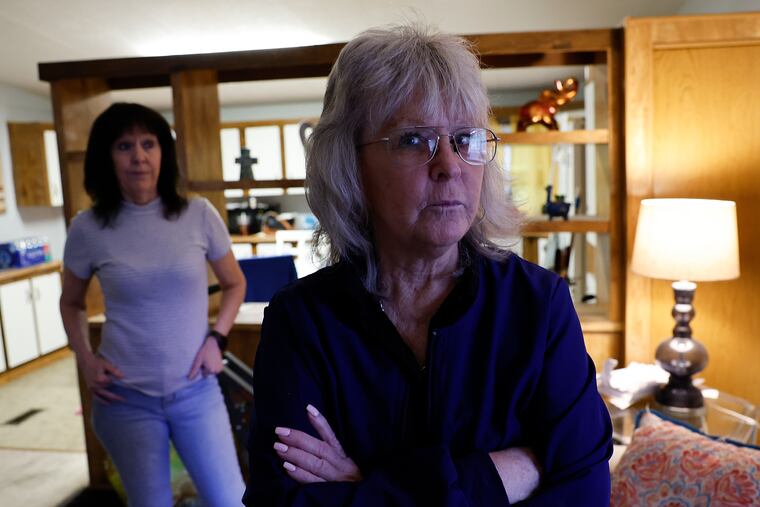Lawyers for late Collegeville accountant can’t find where he invested millions for dozens of trusting clients
“He wouldn’t have stiffed me like this," said a friend of Joseph Pezzano's who gave him $3 million. But others are starting to panic. The estate wants a judge to appoint a receiver.

Lawyers for the estate of Collegeville accountant Joseph Pezzano say they’ve been unable to find any records supporting millions of dollars in investments he’d handled on behalf of dozens of clients in at least three states.
Pezzano’s death last Christmas Day at the age of 73 has set off a flurry of litigation as clients seek to recover investments ranging from $12,000 to $3 million each.
The FBI is conducting interviews and issuing subpoenas. On Thursday, the accounting firm where he’d worked pulled down its website.
“This is disaster recovery. That’s the best way I can describe it,” said Eric Lechtzin, whose Newtown legal practice represents victims of securities fraud. He is not involved in the Pezzano case.
“He might not have been a crook. Maybe he was just irresponsible and things got out of hand,” Lechtzin said. “But now nobody knows how to put the pieces back together.”
Court records put the number of Pezzano investors at about 70, but that number has been growing since alarmed clients stopped receiving quarterly statements and regular distributions of funds following his death. Rough estimates on the total amount missing run from between $10 million and $30 million.
» READ MORE: ‘Ponzi scheme’ or bookkeeping error? The FBI is probing a Collegeville investment firm.
New court filings in Montgomery County Common Pleas Court have done little to assuage investors’ concerns — or even confirm that the money is recoverable.
In a filing Wednesday, lawyers at Timoney Knox, which is representing Pezzano’s estate, wrote that it “appears” that Pezzano had “performed, or purported to perform, certain investing services” for clients through his investment operation, JPA R/E Associates.
Nearly five months after Pezzano’s death, however, they have been “unable to locate or identify investments made by JPA that would correspond to investments shown on the statements the decedent prepared and delivered to investors,” the lawyers wrote.
The estate is asking a judge to appoint a receiver to handle the claims being filed by Pezzano investors.
Some clients have told The Inquirer that they believed the investments were in real estate, while others said they were told the money was going to IRAs.
Adam Sager, who represents two investors, has questioned whether Pezzano was running a “Ponzi scheme,” perhaps involving at least 10 Jersey Shore rental properties that are in his name.
“The Bernie Madoff story comes to mind,” Sager said last week.
But a handful of Pezzano clients and friends believe the matter could be attributed to poor record-keeping and Pezzano’s failure to plan for how JPA would be managed after his death.
“I think all the money is there and somewhere there is paperwork,” said Earl Peacock, a friend of Pezzano’s who said he is out at least $3 million. “He wouldn’t have stiffed me like this.”
Pezzano, a South Philadelphia native and longtime Collegeville resident who was widely trusted in the community, was the senior business adviser at the public accounting firm Bond, Pezzano and Etze.
Peacock said Pezzano, whom he’d know for 20 years, lived modestly.
“He’d get a turkey club sandwich, eat half and take the other half home for dinner,” Peacock said. “I’ll never in my life believe he was a criminal. You’d have to do something with your crime money. That’s why you’re a criminal.”
Bond, Pezzano and Etze has sought to distance itself from Pezzano’s investment operation, repeatedly sending e-mails to clients stating that it “has no affiliation” with JPA.
But statements that JPA sent to investors list the same address and phone number as the accounting firm.
The firm removed Pezzano’s profile from its website after The Inquirer published an article last week on the missing funds. Later, the entire website was shut down.
The estate attorneys told a judge that Pezzano appears to have “commingled investor funds” within JPA and was making payments to some, but not all, investors from a common pool of JPA funds.
They also found that he had “invested heavily” in a company called Quantum Mechanix, which makes pop-culture action figures and other collectibles. It was acquired by a U.K. company last year. Records show that Pezzano was the treasurer of Quantum Mechanix. It is unclear if any JPA funds were invested in the company.
The estate attorneys also said they had located a Truist Bank account in the name of JPA containing about $900,000.
Lechtzin said investors should always search the BrokerCheck database run by the Financial Industry Regulatory Authority to get information on financial brokers.
“If you’re talking to someone who wants to give you investment advice or take your money, and you can’t find them on there, you better think twice,” Lechtzin. “You’re just rolling the dice, and far too often, this is how things end up.”
Pezzano is not in the database. Nor does it appear that he had an active public accountant license in Pennsylvania. His estate told the court that there is “no record of JPA as a formal entity within the Commonwealth.”
Lawyer’s for Pezzano’s estate and his accounting firm declined to comment for this article.